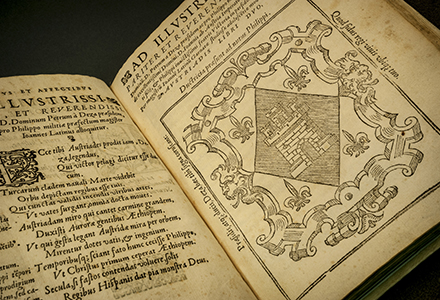Another ‘first’ for UNC’s library: 7 millionth book
The 7 millionth volume in the University of North Carolina at Chapel Hill’s library will be another first.

The 7 millionth volume in the University of North Carolina at Chapel Hill’s library will be another first.
Juan Latino, author of a 172-page book of Latin poetry published in 1573, has been described by scholars as the first person of sub-Saharan African descent to publish a book of poems in a Western language. His book, which will officially be received during a free public celebration on March 20, will join a 1483 book printed by William Caxton, England’s first printer (UNC’s 1 millionth volume); a copy of the first English book with color printing from 1486 (2 millionth); and “Several Poems” by Anne Bradstreet (1678), the first New World publication of the first poetess of British North America (4 millionth).
“Juan Latino’s book fits admirably with the tradition of millionth volumes at UNC, many of which also represent firsts,” said Claudia Funke, curator of rare books at UNC’s Wilson Special Collections Library. “Latino’s book is significant as a first because it marks the beginning of African Diaspora literature in the West.”
The book is a gift from the John Wesley and Anna Hodgin Hanes Foundation, which is based in Winston-Salem. Through its foundation, the Hanes family has funded each of the library’s millionth volumes. During the March 20 celebration, Borden Hanes will present the book in memory of his father—University alumnus, friend and benefactor Frank Borden Hanes—who died in July at the age of 93.
With this milestone, UNC becomes one of only 21 university libraries in North America to hold more than 7 million volumes. It also becomes one of a handful of U.S. libraries—including Harvard, Yale, the Boston Public Library and the New York Public Library—to own Latino’s first book.
The volume is an especially appropriate choice for UNC, said William Andrews, professor in the department of English and comparative literature in the College of Arts and Sciences. Not only does the library hold extensive writings by African Americans who experienced slavery, but Latino’s story recalls that of the self-taught slave George Moses Horton, who wrote poetry for UNC students in the 19th century and found “his earliest audience and encouragement on the Carolina campus,” Andrews said.
“Acquiring Juan Latino’s extremely rare and valuable text epitomizes the mission of UNC to serve as an international center for the study of the literature of the African Diaspora in the West,” Andrews said.
Latino was born around 1518 in either Africa or Spain. He was a slave in a noble Spanish household, serving as a page to the family’s son. While accompanying the young duke to classes, Latino learned Latin and Greek. He eventually earned his freedom and became a professor of Latin Grammar in Granada. His surname Latino or Latinus reflects his mastery of the Latin language.
Latino’s book has an especially lengthy title: “Ad Catholicum … Philippum Dei gratia Hispaniarum Regem …, epigrammatum liber : De que … Pii Quinti Romanae Ecclesiae Pontificis … Liber unus : Austrias carmen de excellentissimi domini D. Ioannis ab Austria, … re benè gesta, in victoria mirabili eiusdem Philippi aduersus perfidos Turcas parta … per magistrum Ioannem Latinum Garnatae studiosae adolescentiae moderatorem ; Libri duo.”
The phrases in that title describe the volume’s three parts: epigrams, or short verses, dedicated to King Philip of Spain on the birth of Prince Ferdinand; a book of verse regarding the king and Pope Pius V; and the “Austriad,” a long poem on the 1571 Battle of Lepanto.
Visitors may view the book during a reception beginning at 5:30 p.m. on March 20 in the Peacock Atrium at the FedEx Global Education Center. At 6 p.m. in the Nelson Mandela Auditorium, Chancellor Carol L. Folt will formally accept the book. Michael A. Gómez, professor of history and Middle Eastern and Islamic studies at New York University, will conclude the evening with a lecture titled “Juan Latino and the Dawn of Modernity.”
Published March 11, 2014




